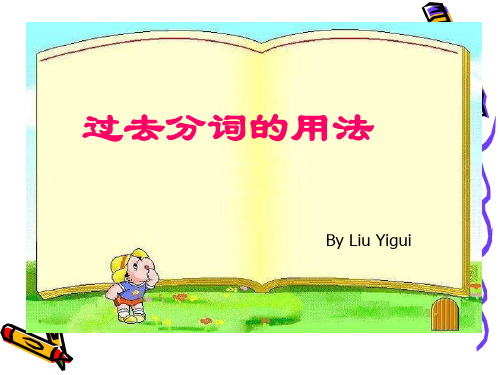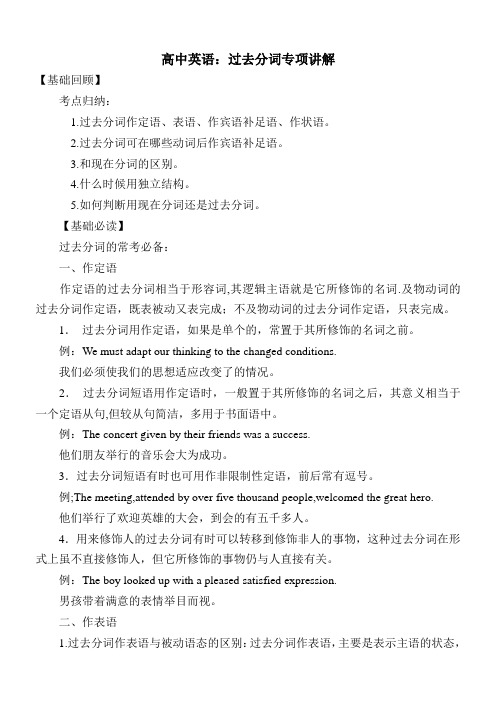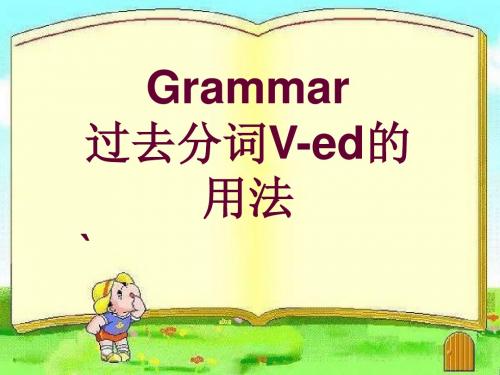高中英语高考语法过去分词讲与练
- 格式:doc
- 大小:178.00 KB
- 文档页数:7



高中英语:过去分词专项讲解【基础回顾】考点归纳:1.过去分词作定语、表语、作宾语补足语、作状语。
2.过去分词可在哪些动词后作宾语补足语。
3.和现在分词的区别。
4.什么时候用独立结构。
5.如何判断用现在分词还是过去分词。
【基础必读】过去分词的常考必备:一、作定语作定语的过去分词相当于形容词,其逻辑主语就是它所修饰的名词.及物动词的过去分词作定语,既表被动又表完成;不及物动词的过去分词作定语,只表完成。
1.过去分词用作定语,如果是单个的,常置于其所修饰的名词之前。
例:We must adapt our thinking to the changed conditions.我们必须使我们的思想适应改变了的情况。
2.过去分词短语用作定语时,一般置于其所修饰的名词之后,其意义相当于一个定语从句,但较从句简洁,多用于书面语中。
例:The concert given by their friends was a success.他们朋友举行的音乐会大为成功。
3.过去分词短语有时也可用作非限制性定语,前后常有逗号。
例;The meeting,attended by over five thousand people,welcomed the great hero.他们举行了欢迎英雄的大会,到会的有五千多人。
4.用来修饰人的过去分词有时可以转移到修饰非人的事物,这种过去分词在形式上虽不直接修饰人,但它所修饰的事物仍与人直接有关。
例:The boy looked up with a pleased satisfied expression.男孩带着满意的表情举目而视。
二、作表语而被动语态则表示动作。
例:The cup was broken by my little sister yesterday.茶杯是昨天我小妹打碎的。
(是被动语态,表示动作)The library is now closed. 图书馆关门了。
(过去分词作表语)2.过去分词表示被动和完成,V-ing 形式表示主动和进行.有些动词如interest,bore,worry,surprise,frighten 等通常用其过去分词形式来修饰人,用-ing 形式来修饰物。

过去分词作定语、表语和宾语补足语作用与用法过分(表示和被动的动作) 是有形容词.副词的作用,在句中可以用作定语,表语,宾语补足语和状语足语和状语1.定语: 过分做定语,表示分词的动作与所修饰的名词之间存在被动关系,单一的确过去分词做定语一般放在被修饰的名词之前,过去分词短语作定语放在被修饰的名词之后,过去分词及过去分词短语作定语均可以转换为一个定语从句过去分词短语作定语均可以转换为一个定语从句The broken window (=The window which was broken) will be replaced soon. 破损的窗户很快就会被换掉. The books bought yesterday (=which were bought yesterday) are of high quality. 昨天买的书确实很不错昨天买的书确实很不错【点拨】过去分词和与其相关的名词、代词之间构成一种"动宾关系",即"被动态"。
过去分词作定语,主要说明"业已完成的动作"或是"一个在以前某个未知时间发生的动作" 。
单个过去分词作定语,分词一般说来写在被修饰的名词、代词之前;分词短语作定语时,分词放在被修饰词之后在被修饰词之后(1)表示情绪的过去分词作定语:表示情绪的过去分词作定语:--She threw me a quick, frightened glance.他迅速而惊恐地看了我一眼他迅速而惊恐地看了我一眼--His face wore a puzzled expression.他脸上有一种困惑的表情他脸上有一种困惑的表情--He had a pleased look on his face.他脸上现出高兴的神情他脸上现出高兴的神情--We can hear his excited voice.我们可以听到他激动的声音我们可以听到他激动的声音----The inspired soldier soon calmed down. 那个受到鼓舞的士兵很快就平静下来了那个受到鼓舞的士兵很快就平静下来了--The frightened girl sat in the corner quietly. 那位吓得惊慌的姑娘一声不响地坐在角落里。


GRAMMAR过去分词作宾语补足语过去分词作宾语补足语,表示被动的动作或完成的意义,宾语补足语与宾语之间常常存在逻辑上的动宾关系,即宾语是过去分词所表示的动作的承受者。
【归纳】可以接过去分词作宾语补足语的动词主要有:★find, watch, see, observe, look at, hear, listen to,notice等感官动词。
如:He tried the door and found it locked.We are pleased to see the problem settled so quickly.We can hear the windows beaten by the heavy rain drops.★make, get, have, keep, leave等使役动词。
如:They managed to make themselves understood in very simple English.It is wise to have some money put away for old age.He was very busy and often left his lunch untouched.★wish, like, want, order等表示“希望、想要、要求”的动词。
如:The boss wouldn’t like the problem discussed at the moment.I want my house painted white.【拓展】★have sth. done有两种解释:一是表示主语有意志的行为,have具有使役意义;二是表示“遭遇”、“经历”,此时过去分词所表示的动作是违背主语意愿的。
如:We ought to have her examined by a doctor.The old man had his leg broken in the accident.★介词with后也可接过去分词作宾语补足语,构成with复合结构。
英语语法系列之过去分词【知识梳理】1 定义:动词的-ed分词即过去分词,是由动词的过去分词构成,一般只有一种形式。
2 过去分词的语法作用:过去分词一方面具有动词的性质,另一方面也相当于一个形容词或副词,在句中可以作表语、定语、状语和补足语。
1 过去分词作表语,主要表示主语的心理感觉或所处的状态。
如:Don’t touch the ga becaue it i broen不要碰那个杯子,它是坏的。
He i quite 1880’1880’eA added; hedB added; to be hedC adding; to be hedD adding; being hed 答案:B解析:根据句子结构判断,此处为独立主格结构,且功课是被完成,因此用过去分词形式。
变式训练:2 ________ b a greater demand for vegetabe,farmer have buit more green houeA DrivenB Being drivenC To driveD Having driven答案 A解析:本题考查非谓语动词。
句意为:受对于蔬菜的更大量需求的驱使,农民们建了更多的暖棚。
空格处为句子的状语,其逻辑主语为farmer,与drive之间存在被动关系,故用被动形式。
例4 2022四川4 Ladie and gentemen, e to a come to a common of the o – caed greenhoue gaeA.ed the great hero.A.to be attended B.being attended C.attended D.having attended 答案:C解析:此处考查非谓语动词做定语,修饰前面的名词,和名词构成被动关系。
31 (2022石家庄市高中毕业班第一次模拟考试)______the financia crii, our government ha taen a erie of meaure ______itA Faced with; to dea withB Facing with; deaing withC Faced with; deat withD Facing with; to deat with答案:A解析:此处考查非谓语动词做状语,和主语构成被动关系,当face和with连用,要用短语be faced with …,做状语时,be省略。
高中英语高考语法过去分词讲与练 过去分词只有一种形式,即-ed形式或特殊形式。 过去分词通常表示被动,完成。
pollute polluted write written show showed/shown 过去分词的否定: not done ★A.定语: 过去分词作定语只有一个词时,通常放在被修饰的名词前面(但也有例外),是一个短语作定语时,就放在被修饰的名词之后。过去分词作定语时,被修饰的名词与过去分词之间是被动关系。 1)We can’t live on borrowed money. 2)The forgotten men and women of our country will be forgotten no longer. 3)You mustn’t drink the polluted water. 4)You mustn’t drink the water polluted by the chemicals from the factory. 5)The computer centre, opened last year, is very popular among the students in this school. 6)Jim has retired, but he still remembers the happy time spent with his students. 7) ---- Can those seated/sitting at the back of the classroom hear me? ---- No problem. 8)Experts think that the recently discovered painting may be a Picasso. ●以下过去分词作定语,虽然是一个词,但习惯上放在被修饰的名词之后: 1)A great number of students questioned said they were forced to practice the piano. 2)Now that we’ve discussed our problem, are people happy with the decisions taken? 3)All the efforts made will pay off, at last. 4)After completing and signing it, please return the form to us in the envelope provided. 5)These men undergo a long period of testing and training. One of the things tested is their behavior under stress. 6)The head of the museum reported paid 200 million dollars for the painting. 7)As the researchers expected, 30% of the drivers surveyed said that they fell asleep while driving. 8)Forty-two percent of people asked admitted that they turned to the back of the book to read the end before finishing the story 9)The money collected should be made good use of to help the people who suffered a lot in the earthquake. (collected也可放在money的前面) a carefully(badly)written article (report/composition) a widely(narrowly) used language (tool/book) a newly discovered island (village/tomb/forest) a newly invented/made machine (helicopter/fan) a well(badly) built bridge (dam/house/railway) a highly developed country (state/province/city) ●以下过去分词作定语只表示完成,不表示被动: a fallen tree/leaf: 倒下的树/落叶 the risen sun/moon: 升起了的太阳/月亮 a faded rose: 凋谢的玫瑰花 a retired worker: 退休工人 an escaped prisoner: 逃犯 a returned student: 归国留学生 ★B. 表语: 过去分词可放在系动词be, become, get, look, seem, appear, sound等后作表语,表示 主语自身的感受。 1)Everybody is really excited about the new Olympic stadium. 2)He became inspired when he thought about helping ordinary people. 3)The painter looked tired after working for a whole day. 4) My mother appeared pleased with the lanterns she had made. ●以下动词除scare, delight, trouble,stress (使焦虑不安;使疲惫不堪)外均可加ed或 ing构成一个形容词。-ed形容词常表示主语或被修饰的人/动物自身的感受; ing形容词常表示主语或被修饰的名词使/令人有某种感受。 surprise, astonish, amaze, shock, frighten, terrify, alarm(使害怕/惊恐), touch, move, annoy(使生气/恼怒), bore(使厌烦), disturb(使焦虑/烦恼/不安/惊讶), please, amuse, fulfill(使高兴/满意), encourage, inspire, tire, exhaust, interest, satisfy, excite, relax, disgust(使反感), worry, frustrate(使沮丧), disappoint, embarrass, confuse, puzzle, thrill, depress, convince… boring : 令人生厌的; 令人厌倦的; 没趣的; 乏味的; 无聊的 annoying: 使人烦恼的/心烦的/生气的; 使人气恼的/恼火的/讨厌的 【scare --- scary】 【delight ---delightful】 【trouble ---troublesome】 【stress -- stressful】 【upset ---upsetting】 ●以上动词构成的-ed形式还可用来修饰以下名词: face, look, laugh, smile, eye, voice, manner, heart, expression, tone, cry, feeling, conversation, pace等。 1)Her excited laugh shows that she has been hired by the company. 2) Can you see your mother’s frightened eyes? 3) He told me the news in a very surprised voice. ★C. 状语: 过去分词作状语时,句子主语与它之间的关系是被动关系。它主要可以用作: ●①. 原因状语: 1)Bitten twice, the postman refused to deliver our letters unless we killed our dog. 2) Ordered over a week ago, the books are expected to arrive any time now. 3)Offered an important role in a new movie, Andy has got a chance to become famous. 4)Reminded not to miss the flight at 15:20, the manager set out for the airport in a hurry. 5)Not given enough time, he couldn’t finish the job as planned. 【以上过去分词可以改为having been done结构。】 ●②. 时间状语: 1)Seen from space, the earth looks like a blue ball. 2)Translated into English, the sentence was found to have an entirely different word order. ●③. 条件状语: 1)Given the right kind of training, these young players may one day grow into international stars. 2)Taken in time, the medicine will have no side effect. 3)Compared with his brother, he should make greater efforts to study English. 4)Grown in rich soil, these seeds can grow faster. ●④. 伴随状语: 1)The president came to the square, followed by about forty guards. 2)Followed by some officers, Napoleon inspected his army. ●⑤. 在although, though, even if, even though, whether等后构成让步状语: 1)Although beaten by the enemy, he refused to let out the secret. 2) We will stay here even if starved to death. 3)Whether given money (or not), she will do the work well. ●以下过去分词短语也是让步状语: 1)Tired after the long journey, I still enjoyed meeting the aliens on the space station. 2)Injured in the accident, she can walk as fast as you. 3)Given only six months to live, Freddie simply refused to die. ●⑥. 过去分词可用在when, while, once, until, unless, as if, if, than, as等后面, 作各式状语: